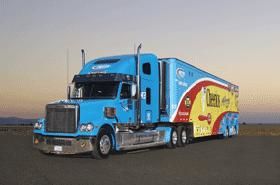Reefer Or Dry Van
Topic 20404 | Page 1

I think the pay and the insurance package for each company is different not by much in some, however my I get .47 cpm and 99.00 insurance mileage is between 2300-to 3200 if you run hard.
Been with this company (Dry van) a little over a year now and the cpm is to .48 but their mileage has been short to mediocre w avg. of 2300 miles per week. Their insurance is running $200 per week.
Reefer company I'm thinking of is offering start pay of . 43 cpm w/ $32.00 per week foe insurance.
Any comments will be welcomed
Dry Van:
A trailer or truck that that requires no special attention, such as refrigeration, that hauls regular palletted, boxed, or floor-loaded freight. The most common type of trailer in trucking.CPM:
Cents Per Mile
Drivers are often paid by the mile and it's given in cents per mile, or cpm.
Reefer:
A refrigerated trailer.

Shadow, are you on a bi-weekly fleet? I thought your cpm was a bit low for Shaffer. I do know they pay less for other options besides the national fleet.
CPM:
Cents Per Mile
Drivers are often paid by the mile and it's given in cents per mile, or cpm.

What I'm getting at is, I've never drove reefer so do any of the members think it's a good idea to make the change from dry van to reefer knowing the difference in pay and cost of the innsurance?
Dry Van:
A trailer or truck that that requires no special attention, such as refrigeration, that hauls regular palletted, boxed, or floor-loaded freight. The most common type of trailer in trucking.Reefer:
A refrigerated trailer.
OWI:
Operating While Intoxicated

Well, all things considered, it's not advised to changes companies (or the type of freight you pull) because of a lack of miles. Lack of miles can be due to the driver, a particular dispatcher , or random freight levels. All of those can be fixed - except for freight. Freight levels will ebb and flow.
Don't pull reefer unless you wanna pull reefer.
$200 a week, to me, is expensive. I pay just around $400 a month for benefits for my entire family, and that includes everything like dental and vision.
Earning potential is up to the driver. And it's preached here that a driver can do well at any company, because it's all about the driver's ability to produce and therefore earn. However, all things remaining equal, a driver performing well at a company that pays more cpm than another will obviously make more money. Is it worth it to switch companies for a few cents per mile? Well, a difference of 5 cents is a difference of about $500 gross a month, using an average of 2500 miles a week to calculate. But a simple math exercise is different than real world miles. Miles will vary. However, you should be able to run 2500 weekly, if not more, based on how hard you run.
Make sure the problem isn't you first (e.g. clock management). Then, speak with your dispatcher. That's a good starting point. Using the two companies you listed, to me it doesn't make sense to jump ship for a company that's less for insurance but 5 cents less on pay. That difference in cpm and insurance cost somewhat evens out, comparing your two companies listed.
Focus on doing your part to increase your mileage, and accept the fact that freight levels do vary. If you wanna switch to reefer because you wanna pull a reefer - then that's a different story. Keep in mind when you switch companies you're starting all over again - new dispatcher, new policies, etc...
Dispatcher:
Dispatcher, Fleet Manager, Driver Manager
The primary person a driver communicates with at his/her company. A dispatcher can play many roles, depending on the company's structure. Dispatchers may assign freight, file requests for home time, relay messages between the driver and management, inform customer service of any delays, change appointment times, and report information to the load planners.CPM:
Cents Per Mile
Drivers are often paid by the mile and it's given in cents per mile, or cpm.
Reefer:
A refrigerated trailer.
HOS:
Hours Of Service
HOS refers to the logbook hours of service regulations.Their insurance is running $200 per week
What??? Do you mean per month, maybe? I hope!
do any of the members think it's a good idea to make the change from dry van to reefer knowing the difference in pay and cost of the insurance?
I'm assuming you meant $200 per month so you certainly would not want to change companies for a difference of a few bucks per week.
I agree with Six String, there's no reason you shouldn't be able to get more miles. You have to figure out why you're not getting more miles. It has nothing to do with the type of freight you haul. Any type of freight can get you 2,500+ miles per week. Now if you were working for a smaller company it might be possible they're on special accounts that entail driving fewer miles per week. But if you're with one of the major companies then the miles are there. You just have to figure out why you're not getting more.
Dry Van:
A trailer or truck that that requires no special attention, such as refrigeration, that hauls regular palletted, boxed, or floor-loaded freight. The most common type of trailer in trucking.Reefer:
A refrigerated trailer.
OWI:
Operating While Intoxicated

No, for a fact it's $200 per week. I couldn't believe it myself. On the other side we fill out PTA's (projected time of availability) when we depart a shipper so by the time you put in an MT call you should be assigned another load by this time and as now , I'm "waiting". I try to manage my time so I don't have to do recaps but if have to wait for another load or assigned loads where the customer is not open on weekends then what ???? Recap no good for this day. Loosing more time. It is a small company and I'm considering to make the change and take my chances. My time goes in tomorrow. Also, whrn I run. - I run hard. Carry my lunch on the road with me and only stop for 1/2 hour break or toilet. I don't stop to have a meal until my 10 hours is up. Advice now ???
Shipper:
The customer who is shipping the freight. This is where the driver will pick up a load and then deliver it to the receiver or consignee.
OOS:
When a violation by either a driver or company is confirmed, an out-of-service order removes either the driver or the vehicle from the roadway until the violation is corrected.

No, not bi-weekly, im OTR with a year under my belt now.
Shadow, are you on a bi-weekly fleet? I thought your cpm was a bit low for Shaffer. I do know they pay less for other options besides the national fleet.
OTR:
Over The Road
OTR driving normally means you'll be hauling freight to various customers throughout your company's hauling region. It often entails being gone from home for two to three weeks at a time.
CPM:
Cents Per Mile
Drivers are often paid by the mile and it's given in cents per mile, or cpm.

No, not bi-weekly, im OTR with a year under my belt now.
Shadow, are you on a bi-weekly fleet? I thought your cpm was a bit low for Shaffer. I do know they pay less for other options besides the national fleet.
Shadow, you might want to contact somebody then. Shaffer is supposed to be paying more than that for the national fleet. I'd imagine this would especially hold true since you already have experience.
This is straight from their website:
"If you have one or more years of verifiable experience, you may qualify to start in our National Fleet at our experienced truck driver pay rate. Drivers will be paid $.49 to $.52 per practical mile depending on their experience and work history over the last five years. The top 25 percent of our fleet will now average over $72,000."
It seems to me that you should at least be getting paid .49 cpm.
OTR:
Over The Road
OTR driving normally means you'll be hauling freight to various customers throughout your company's hauling region. It often entails being gone from home for two to three weeks at a time.
CPM:
Cents Per Mile
Drivers are often paid by the mile and it's given in cents per mile, or cpm.
New Reply:
New! Check out our help videos for a better understanding of our forum features

















Preview:








 TT On Facebook
TT On Facebook
Been with this company (Dry van) a little over a year now and the cpm is to .48 but their mileage has been short to mediocre w avg. of 2300 miles per week. Their insurance is running $200 per week.
Reefer company I'm thinking of is offering start pay of . 43 cpm w/ $32.00 per week foe insurance.
Any comments will be welcomed
Dry Van:
A trailer or truck that that requires no special attention, such as refrigeration, that hauls regular palletted, boxed, or floor-loaded freight. The most common type of trailer in trucking.CPM:
Cents Per Mile
Drivers are often paid by the mile and it's given in cents per mile, or cpm.
Reefer:
A refrigerated trailer.